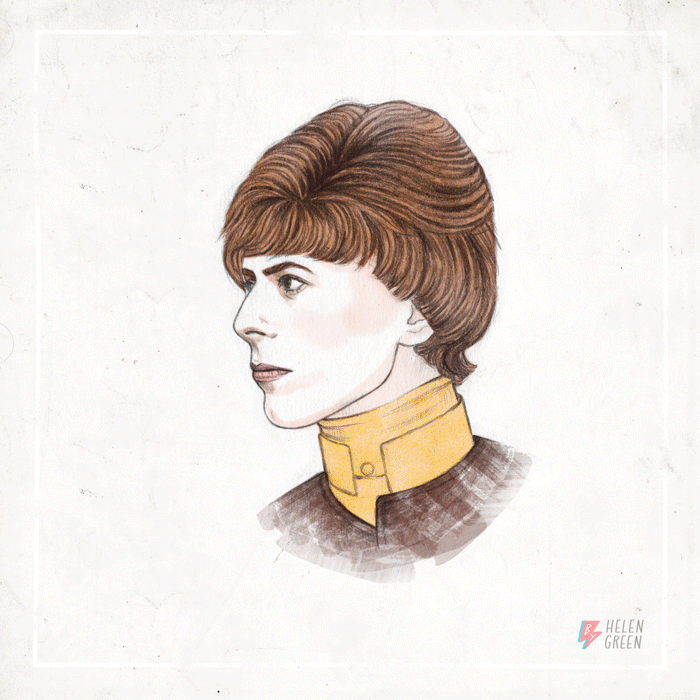David Bowie has passed away. I was perturbed when a friend dropped that bombshell on me. “What??” “David Bowie. Died.” Just a couple of days ago, my friend had shared David Bowie’s new music video–Lazarus–online.
I am not a David Bowie fan. Neither am I one of those people who turn into overnight fans following the death of celebrities. B.B. King, King of the Blues gave birth to many blues fan upon his death. As did Michael Jackson. Knowing Beat It, Billie Jeans or I’ll Be There–songs reminisce of your childhood–does not automatically make you one of his fan.
Fanatic (noun)
a person filled with excessive and single-minded zeal
Life on Mars, a 2005 live performance recording at Fashion Rocks was my first Bowie song. I had heard it from an online eclectic radio station and it was my foray into this genre. The song opens with the audiences’ rapturous applause/ David Bowie emerges from behind the curtain. Gentle piano tones accompanied Bowie’s husky voice as he sang, “It’s a God-awful small affair…” It was not long before he rose into a small vibrato at the start of the chorus, and he finished with a strong one with, “Is there life on Mars?”
I paused the radio broadcast when the song ended and searched for the video. There he was, dressed in a grey tuxedo, tall and magnificent yet insignificant. I guess that was what he made his life out to be–a small stature in this huge universe. On a separate occasion, the radio station bestowed me another Bowie’s classic (released 1 year after Life on Mars in 1972): Starman.
There’s a starman waiting in the sky. I love astronomy and cosmology. I look at the skies, wherever, whenever. Once I had casually looked up while walking home. A meteor streaked briefly across the clear night sky.
All of the Bowie songs that I know are related to astronomy; the third being Space Oddity. I found it when Chris Hadfield’s music video went viral. Chris Hadfield is a retired Canadian astronaut and he was the first Canadian to walk in space. He had revised and covered this song on board the International Space Station a few years back. The first MV from space. Nothing could go wrong.
Initially I had preferred Chris Hadfield’s version to David Bowie’s original composition. The subdued and enchanting disposition delivered by an actual astronaut–stuck in a tin can, no less–has brought the song to life. Hadfield’s experience in space had exalted Space Oddity to greater heights.
This is Ground Control to Major Tom
You’ve really made the grade
And the papers want to know whose shirts you wear
Now it’s time to leave the capsule if you dare

Major Tom is a fictitious character created by Bowie. Bowie’s interpretation of the character evolved throughout his career. Perhaps Major Tom is Bowie’s alter ego that mirrored his life, growth and death. This is Bowie’s swan song written for himself in advance. Not Blackstar, not Lazarus–both are tracks from his 25th and final studio album.
After revisiting both versions of Space Oddity following Bowie’s departure, Bowie’s 1969 composition feels much richer. But I might have bereaved. Both arrangements exude different moods, found in the entireties of their own intricate subtleties.
Blackstar was released on 8 January 2016, two days prior to David Bowie’s death. This is the only album that does not feature Bowie on its cover. Tony Visconti, Bowie’s producer said that Bowie had deliberately planned for this record to be “his parting gift” for his fans. As though prophesying his death, he sang:
Look up here, I’m in heaven
I’ve got scars that can’t be seen
I’ve got drama, can’t be stolen
Everybody knows me now
It got everyone’s attention. People started interpreting, speculating, allegorising and discussing his final work of art. Why Blackstar? The media had picked up wind that black stars are used to describe (breast) cancer lesion on mammograms. That may be the case. Or not. Or maybe there is more to it. I am not Bowie’s fan but anyone can postulate.
David Bowie has appeared on all of his album art except for Blackstar. Does it not make sense for him to be the black star? In Blackstar’s music video, a woman picks up a skull crowned with jewels. She picks the head off and worships it with a cult-following. I interpreted it as how his legacy remains, but he has left his vessel–his brainchild–behind.
A headless skeleton gravitates towards the black star that radiates on its linings. An allegory of his body succumbing to the wraths of his cancer?
Something happened on the day he died
Spirit rose a metre and stepped aside
Somebody else took his place, and bravely cried
(I’m a blackstar, I’m a blackstar)
The more I read into it, the more I believe that David Bowie conversed with his characters (possibly even personas). He wrote to allow his characters to parley. Through and through, it feels like a vehement discourse between alter egos searching for answers in and to life–Bowie’s internal monologue, his inner voice.
Most of the time, there are no answers to life and its innumerable problems. Sometimes an opportunity for closure does not even show up. Blackstar may very well be David Bowie at his creative peak. His studio albums are his autobiographies; his final one open-ended. It is an appropriate curtain call that instigates more questions than solutions–all planned and intended by the creative himself.
David Bowie has made an indelible impact on culture. He defied gender norms and sexuality and it is especially evident on the covers of his 1970’s Man Who Sold the World and 1971’s Hunky Dory albums. David Bowie made it alright for people to be different. The media calls it Gender Fluidity. Bowie told Playboy in 1976, “It’s true, I’m bisexual. I suppose it’s the best thing that ever happened to me.” He retracted that statement later in life, describing himself as a “gay mime” and went on to marry two wives (divorced and remarried). He was polysexual. He was human. He was only human.
And he was never particularly fond of his voice. His music goes from eclectic/avant-garde to eccentric and not everyone can appreciate it. Bowie saw himself as a writer but he sang his songs because nobody else did. But more than a writer, he was also an avid reader–and he released a list of his top 100 books.
Everyone relates to David Bowie differently. He has unequivocally influenced the world, but his last track of Blackstar was aptly titled I Can’t Give Everything Away. We have to seek what we are looking for for ourselves.
This brings me back to Space Oddity. He could not have written the song to converse with his 69-year-old self. But he could have. (Subconsciously.) He came as a scintillator and left as a streak of glimmer. Are we all but not lost stars waiting to fall?
Still not a David Bowie fan. My interpretations may be utterly and absurdly incorrect. But I felt such a deep emotional connection with him. One on a very personal level. His legacy is here to stay.
And the stars look very different today. Rest in peace.


